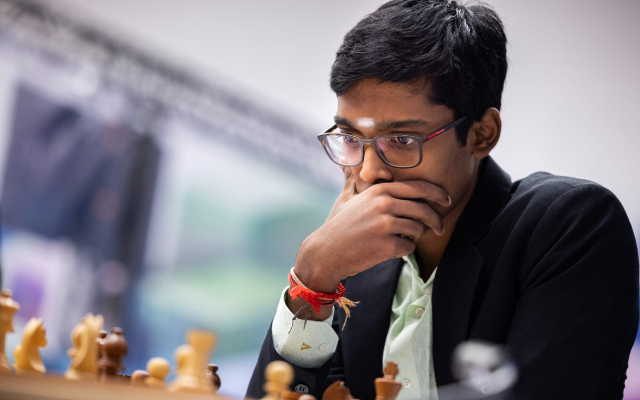
Every success story has silent heroes. In Indian chess, RB Ramesh is one of them. After becoming the country’s 10th Grandmaster in 2004, he gave in to his inner calling four years later. He quit as a player and switched to coaching when he was 32. The academy run by him in Chennai has produced among others, R Praggnanandhaa and R Vaishali — the world’s only Grandmaster brother-sister duo — and Aravindh Chithambaram. Pragg and Aravindh are taking part in the FIDE World Cup in Goa from October 31. Ramesh has written two books on chess and his commentary drew applause in the past. The following are excerpts from an interview with RevSportz.
Q: You stopped playing when you were young and took to coaching full time. Were you always inclined towards that?
A: I felt I could contribute better as a trainer than a player and I liked teaching. So I wanted to pursue that more seriously. I had been teaching for 10 years before I made that decision and my students were doing well. I had confidence in my teaching skills. I was a player for more than two decades. I decided not to focus on two things at the same time. I felt it was the right time to take that call.
Q: It’s evident that you enjoy what you do. Can you elaborate what exactly this enjoyment is like?
A: It’s heartening to see that we can make a meaningful difference in others’ careers. When they win tournaments, achieve things that make them happy, it also makes us happy that we played a small role in that. As a player, I had doubts, questions, and felt if I had clarity on those, it would help me grow. But there was no one to talk to. When you are a player, it helps if you have a mentor, who cares for your progress and is ready to stand by you in difficult times, teach technical things and so on. I felt everyone had similar needs.

Q: How was it to deal with Pragg when he was a child?
A: It wasn’t very difficult because he was already doing many things correctly. Most children don’t realise their priority that they have to work hard. Most are lazy, not serious. They want to have fun, but don’t want to struggle and come up in life. It’s more difficult to work with such children. Pragg understood he had to work very hard and struggle a lot to become very good at what he wanted to do. So it was mostly about teaching the technicalities of the game.
Q: How do you rate India’s chances at the World Cup? It’s a very strong contingent…
A: Yeah, I mean, year to year, it’s just growing stronger. And we have very good chances. Last time (2023) Pragg was in the finals of the World Cup. And this time, I hope there’ll be two Indians in the finals.
Q: Players sometimes set goals or targets. Do coaches do anything like that?
A: I wouldn’t say it’s healthy to have materialistic targets. We should instead try to make sure the students improve their chess strength. When that improves, results are bound to come. I strongly believe in that. I prefer that approach rather than focusing directly on what I would like my students to achieve. I prefer to focus on making them better and better in their game strength-wise.
Q: Do you feel tension when your students play in big tournaments? Do you follow all the games?
A: Yeah (something happens). It’s not tension. It’s more eager anticipation and some worry. It was more when I was new to the coaching field. Now I handle it better. I don’t usually travel with them. I don’t follow live all the games they play. If it’s normal hours in India, I do.
Q: Does the role played by the coaches sometimes go unrecognised?
A: That’s not just for sports, but in almost every walk of life. Many individual contributions go unrecognised. That’s fine. Ultimately, it’s the players who are performing. Sometimes it hurts. But that was when I was new in the field. Over a period of time, you develop a thick skin and you stop noticing it. It’s just a way of life. In a movie, usually the hero and the heroine get celebrated. But there are so many contributing to the making of a movie. Not everyone can be celebrated. To have such expectations is going to be counterproductive because you know it’s not going to happen. We coaches earn well. And if the students are doing well, people in the field, they know who is working with whom, and they appreciate it. We don’t necessarily have to be celebrated.
Also Read: Tourist season, filmy touch and festival of chess in Goa




